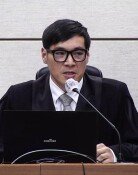[Editorial] Both labor and economy must be made viable
[Editorial] Both labor and economy must be made viable
Posted November. 26, 2000 21:17,
Both internal and external conditions of the nation's economy are now having very difficult spells. To make matters worse, the country's labor movements are also gravely alarming us. The prospects are looming large that the nation's two rival labor unions, the Federation of Korea Trade Unions (FKTU) and the Korea Confederation of Trade Unions (KCTU), are aligning together this time to stage their joint winter struggle.
We understand that the two labor unions as an organization to represent workers' interest decided to take joint action against corporate restructuring which aims at workers' lay-off. Yet, they must realize that manpower reductions are inevitable in order to resuscitate ailing business firms. The labor's blind struggle against any corporate restructuring which requires layoffs, will only delay economic recovery as to incur greater unemployment.
What draws our attention in this regard is the Inchon District Court's request to the bankrupted Daewoo Motor that all the materials must be submitted for the court to ascertain that all the members of the company including the union are prepared to accept the terms of the company¡¯s restructuring. The court's request is a right step to take before it makes a decision on the company's application for the court receivership. For, the company members' self-rescue resolutions, along with its financial and business standing, are very important consideration for the court in making a judgment on the possibility of the company's resuscitation.
If the Daewoo labor union rejects the company's restructuring, the General Motors (GM) which is the only viable bidder now may lose any interest in Daewoo's purchase. The bankrupted automobile firm's sale price will have to fall further, creating the worst circumstances possible for the company. The delayed resolution of the Daewoo case will mean greater burden of injecting public funds which will in turn cause a lowering of our credit ratings overseas.
The labor union of the Korea Electric Power Corporation (KEPCO), which is Korea's biggest public corporation, has postponed its strikes, but there is still the potential for a possible fiasco of power failures by its strikes if the present tug of war between its labor, management and government over the company's privatization becomes aggravated. The KEPCO's profits cannot meet the interest payments for its 25 trillion won debt. It has to borrow money over 4 trillion won every year for the building of its power plant.
The KEPCO will inevitably be bankrupted to a worse extent than Daewoo if we fail to address the case. Its free wheeling management has entailed huge amount of loss which is translated into the public's higher hydro bills.
The KEPCO's labor union claims that its opposition to the spin-off of the KEPCO for its privatization is not an absolutely unnegotiable stand, but is something to be reserve for the time being. It is, however, our view that we cannot any further delay the restructuring of this giant `white elephant' firm.
The KEPCO's privatization will become a litmus test for a privatization of the nation's public corporations. Any wish-washy negotiations to result in an empty restructuring of the KEPCO will also signal the same consequence for privatization plans for major public corporations such as the Korean National Railroad, Korea Heavy Industries and Construction (HANJUNG) and the Korea Gas Corporation.
The government has in the past tended to unwittingly encouraged in a way assertions of selfish group interests by taking popular stand whenever its reform agendas encountered collective resistance by interest groups. While it argued for the reform of public corporations, it made political appointment for their company president which gave rise to loss of trust in the government's personnel policies. The government must have shown an exemplary conduct to respect principles in order to retain the people's confidence.
Our reform agenda for restructuring will be hard to realize once we come to meet the Presidential campaign for the year 2002. This means that we will have barely over one year for the reforms to complete. All the parties in the matters of restructuring must be ready to share their pains and difficulties in order to get rid of root causes for ailing corporations. This is the only way to make both workers and our economy to survive from present economic crisis.






![“설거지해도 그대로”…냄비 ‘무지개 얼룩’ 5분 해결법 [알쓸톡]](https://dimg.donga.com/c/138/175/90/1/wps/NEWS/IMAGE/2026/01/15/133164664.3.png)
